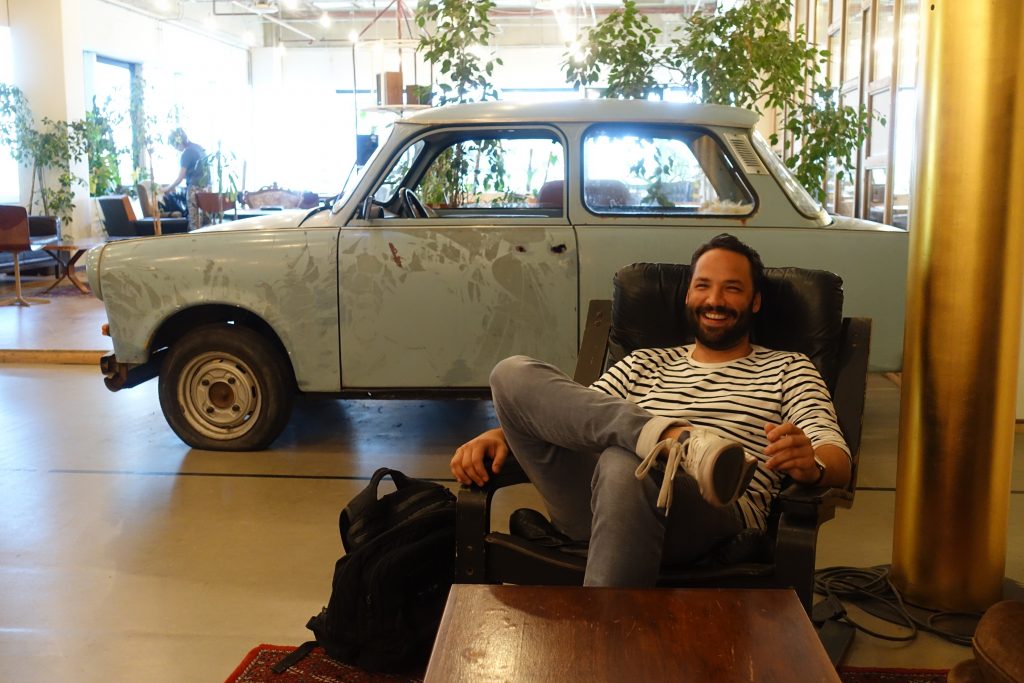A ping pong table in the hallway, two old Trabant cars on the rooftop terrace and millenials in abundance... Entering B building Amsterdam, one will definitely not find a typical 9 to 5 office. On the contrary: it's in this creative work environment - also referred to as a start-up ecosystem - where you'll find the Milkubator, FrieslandCampina's pressure cooker for innovative business projects. We are here to speak with Business Development Manager Hidde Stolwijk, whose job it is to help and guide FrieslandCampina's corporate start-ups.
My task is to help our start-ups with strategic choices and guide them to growth - preferably as fast as possible – in the first few weeks of their existence.
Thirtheen-week pressure cooker
“A good team can turn every idea into a success, even if it’s a bad idea.” At the Milkubator, the road to a successful business model is equally – if not more – important as the idea itself. But to make this process a success, it is essential to assemble a team with the right mindset and skills. People who are willing to take risks, who are adventurous and not afraid to start things on their own. Hidde explains why this is so important: “Our goal is to achieve in three months what would take a year and a half at FrieslandCampina headquarters.”
Building a start-up from scratch within three months sounds like a mission impossible. Still, as a Business Development Manager Hidde mentors three to four of these start-ups during thirteen-week trainings. The teams, each consisting of just three employees, are tasked with one single problem formulated by FrieslandCampina. Problems that are typically high risk, high return issues and are therefore ideal to be tackled in a start-up environment. Hidde: “How we deal with these issues here runs quite counter to the way large corporations handle them. We approach them as if we were standalone start-ups. Through a continuous, iterative process of trial and error and testing, but also by talking to consumers a lot.” While ideas are tested outside the confines of the company, it is essential to keep the idea in line with consumer needs and preferences. Hidde: “This is where start-ups differ from corporations where people sometimes work on a certain product for months, only to find out that it doesn’t meet consumers’ needs after it’s launched. Here, this would never happen, since we are always in touch with prospective consumers. It’s all about launching as fast as possible - even if the product is not perfect yet. It’s the fastest way to find out what steps need to be taken to further improve.”
Unexpected outcomes
“The Milkubator is about seeing developments in the market that we don’t yet understand. Then it’s up to us to select a team that can formulate an assumption, test the idea and set up a business model in a short time.” However, this continuous process of trial and error can also mean that the end product differs significantly from the original idea. As an example, Hidde takes ‘Melt’ ice cream. It started with the task to find the new generation of Frozen Yoghurt products, but ended up as an ice cream that contains four times less calories than conventional ice cream. Hidde: “Our first attempts tasted horrible, but the ice cream that resulted from it was a big success. It is now sold in the web shop and through a food delivery platform. From just an idea to a whole new product, a new business model and a new brand with five different flavors in five months, that's how fast things can go."
The teams not only benefit from the inspiring environment of the start-up ecosystem; they can still lean on the knowledge provided by other departments within FrieslandCampina and use its infrastructure to scale up successful business models quickly. In the end though, the freedom to draw their own plan is an integral part of the process, even when this means the teams will be completely on their own from time to time. Hidde shares a story from the Melt team: ”When we needed different types of ice cream to do a flavor test, it turned out to be too expensive to have the products shipped from England to Amsterdam. So we decided to rent a van and get the ice cream ourselves. Unfortunately, halfway on our way back the cooling system failed and we had to drive the rest of the way with buckets of melted ice cream. That's actually how we came up with the name Melt..."
Future goals
Working in the Milkubator means operating under a lot of pressure and stress while keeping cool (sometimes quite literally). Nevertheless, Hidde clearly sees added value of applying the methodology in the rest of the company. “It would definitely mean making a change from within. A change in the mindset that would benefit FrieslandCampina as a whole.” Last, but not least, Hidde is already dreaming bigger: “I’m looking forward to teach colleagues all over the globe about this new way of working, to make a global impact on the way we do business.”
